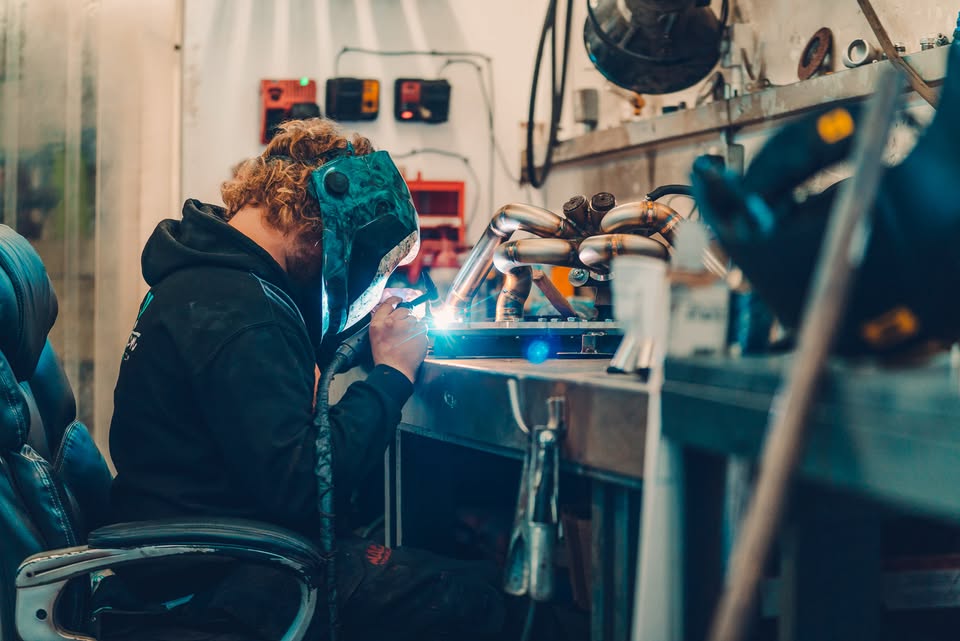Choosing the Right Material for a Turbo Manifold: Why Walton Motorsport Uses 304 Stainless Steel
When selecting a turbo manifold for a performance vehicle, material choice is critical. It affects everything from thermal efficiency and longevity to weight and overall performance under extreme conditions. Walton Motorsport manufactures all of its off-the-shelf turbo manifolds from 304-grade stainless steel, as it offers the best balance of thermal properties, strength, and longevity—qualities backed by a lifetime warranty. While we do manufacture custom turbo manifolds from Titanium and Inconel for specialized projects, 304 stainless steel remains the industry standard for high-performance applications. Let's dive into the pros and cons of different materials commonly used in turbo manifold construction.
Mild Steel (1018, 1020, 1026, etc.)
Pros:
- Cost-Effective and easy to weld
- Good durability in non-extreme applications
- Readily available
Cons:
- Prone to corrossion
- Heavier than stainless steel
-
Prone to cracking over time through thermal cycling
Mild steel is often chosen for budget builds or non-performance applications. However, for high-performance turbocharged vehicles, the drawbacks of heat-induced fatigue and corrosion make it less than ideal.
304 Stainless Steel (1.4301)
Pros:
- Excellent resistance to oxidation and corrosion
- High-temperature strength with good ductility
- Withstands extensive thermal cycling without material fatigue
- Balanced weight-to-strength ratio
- Lifetime durability in high-performance applications
Cons:
- More expensive than mild steel
-
Requires TIG welding for optimal results
304 stainless steel is the go-to choice for Walton Motorsport due to its superior ability to handle the intense heat cycles of a turbocharged engine while maintaining durability and performance over time. Its thermal expansion characteristics allow for reliable operation without excessive cracking, a critical factor for motorsport applications.
321 Stainless Steel (1.4541)
Pros:
- Similar corrosion and oxidation resistance to 304 stainless steel
- Improved resistance to carbide precipitation due to titanium stabilization
- Better long-term durability under extreme heat conditions
Cons:
- More Expensie than 304 stainless steel
-
Slightly less readily available
321 stainless steel is a great alternative to 304 when extreme temperature endurance is required, such as in endurance racing applications where the manifold is subjected to prolonged high-heat conditions.
347 Stainless Steel (1.4550)
Pros:
- Even better resistance to heat-related fatigue than 321 stainless steel
- Superior longevity in high-heat, high-pressure environments
Cons:
- Significant more expensive
-
Not necessary for most high-performance applications
347 stainless steel is typically used in aerospace or ultra-high-performance motorsport applications. While it offers some advantages over 304 and 321, the cost-to-benefit ratio means it is not commonly used for off-the-shelf turbo manifolds.
Inconel (625, 718, etc.)
Pros:
- Unrivaled resistance to extreme heat and oxidation
- Exceptional durability in motorsport and aerospace applications
- Higher strength-to-weight ratio than stainless steel
Cons:
- Extremely Expensive
-
Very difficult to weld and fabricate
Inconel is reserved for the most demanding motorsport and aerospace applications. It excels in environments where extreme heat and pressure exist but is prohibitively expensive and difficult to manufacture. Walton Motorsport produces custom manifolds in Inconel only for the most specialized high-end applications.
Titanium (Grade 2, Grade 5 – Ti6Al4V)
Pros:
- Extremely lightweight compated to stainless steel
- Excellent corrosion resistance
- High strength for its weight
Cons:
- Poor heat retention, leading to cooling inefficiencies
- Brittle under extreme heat cycling compared to stainless steel
- Expensive and difficult to weld properly
Titanium turbo manifolds are niche, primarily for weight-saving applications in motorsport. However, due to its poor thermal properties and high cost, it is rarely used for turbo manifolds outside of exotic builds.
Why Walton Motorsport Chooses 304 Stainless Steel
With decades of motorsport experience, Mike Walton has seen firsthand the impact that material selection has on performance, longevity, and cost. 304 stainless steel strikes the ideal balance between weight, durability, and thermal stability. Unlike mild steel, it won’t rust or crack prematurely. Compared to higher-end alloys like Inconel or 347 stainless steel, it provides reliability and affordability while still handling the extreme conditions of turbocharged engines. That’s why all Walton Motorsport off-the-shelf turbo manifolds are built using 304 stainless steel and backed by a lifetime warranty.
For those looking for bespoke solutions, Walton Motorsport does offer custom Inconel or Titanium manifolds for extreme use cases. However, for 99% of performance builds, 304 stainless steel remains the best choice.
If you're looking for a high-quality, British-made turbo manifold that delivers exceptional performance and durability, check out Walton Motorsport’s range today!

